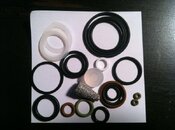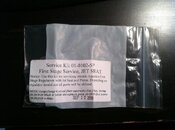Sonic04GT
Contributor
Hello,
Four years ago I had my Atomic B2 DIN environmentally sealed for $50 hoping to keep my 1st stage in better condition while diving saltwater here in South Florida but I haven't been diving very frequently since then. I'm trying to get back into it and the reg hasn't been serviced since September 2010 when I had it sealed and the 2-year service done as well. Of course I'm going to get it serviced soon (along with my Atomic SS1) which is quoted around $100+ with the parts kits. I forgot about the chrystolube on top of that $100+ (I assume another $40?). Now looking at $140-150 for service.
My questions are:
Is this something that is truly worth it for warm saltwater diving or should I have it removed and put the standard ring back on?
Are the parts kits required for every service or only when worn parts are discovered during the inspection? I was told my regulator looked great when I had it serviced in 2010 (purchased in 2008) as I'm very meticulous with my gear, yet I was still charged the $40 for both 1st/2nd stage parts kits on top of the labor.
Money is tight, but I'm trying to not let it get in my way of enjoying diving once again.
I found this bag among my dive stuff recently. It was given to me when I had the 2010 service done. I'm assuming they're unused parts? Or as stated on the package, just not required for the B2? They don't appear used but who knows. I don't think I ever received the non-sealed ring with the holes in it after service now that I think about it.


Four years ago I had my Atomic B2 DIN environmentally sealed for $50 hoping to keep my 1st stage in better condition while diving saltwater here in South Florida but I haven't been diving very frequently since then. I'm trying to get back into it and the reg hasn't been serviced since September 2010 when I had it sealed and the 2-year service done as well. Of course I'm going to get it serviced soon (along with my Atomic SS1) which is quoted around $100+ with the parts kits. I forgot about the chrystolube on top of that $100+ (I assume another $40?). Now looking at $140-150 for service.
My questions are:
Is this something that is truly worth it for warm saltwater diving or should I have it removed and put the standard ring back on?
Are the parts kits required for every service or only when worn parts are discovered during the inspection? I was told my regulator looked great when I had it serviced in 2010 (purchased in 2008) as I'm very meticulous with my gear, yet I was still charged the $40 for both 1st/2nd stage parts kits on top of the labor.
Money is tight, but I'm trying to not let it get in my way of enjoying diving once again.
I found this bag among my dive stuff recently. It was given to me when I had the 2010 service done. I'm assuming they're unused parts? Or as stated on the package, just not required for the B2? They don't appear used but who knows. I don't think I ever received the non-sealed ring with the holes in it after service now that I think about it.


Attachments
Last edited:






